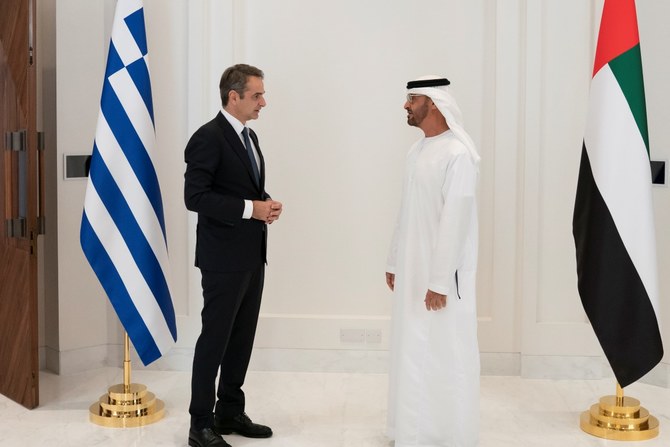On Nov. 18, 2020, Greek Prime Minister Kyriakos Mitsotakis visited Abu Dhabi for the second time in a few months to meet with Crown Prince Mohammed bin Zayed.
The meeting proved historic. Greece and the UAE signed a strategic partnership agreement, including a mutual defense clause. Athens hailed it as one of the most important agreements it had signed since World War II.
Bilateral cooperation on foreign policy and defense is expanding rapidly. On Sunday, Greek Defense Minister Nikos Panagiotopoulos visited the UAE, accompanied by the Chief of the General Staff Gen. Konstantinos Floros, to discuss deepening defense cooperation and to participate in two international defense fairs: IDEX 2021 and NAVDEX 2021.
Last summer, the UAE sent F-16 fighter jets to Crete to participate in military exercises with the Hellenic Air Force.
In a further sign of growing military cooperation, Greece, the UAE, Cyprus, Egypt and France conducted from Nov. 30 to Dec. 6 a joint multinational aeronautical exercise codenamed “Medusa” in Alexandria, Egypt.
The exercise was an unofficial, although direct, message to Turkey against its muscle flexing in the eastern Mediterranean.
A joint military exercise between Greece, Cyprus, Israel, the UAE, Slovakia, Spain, Canada and the US is on the cards for later this year.
“Defense cooperation is very important for Greece as far as it contributes to two sectors — first, in increasing investment by the UAE in Greece’s defense industry; and second, in cooperation between the two countries in technology development and intelligence,” Sotiris Roussos, associate professor at the University of Peloponnese and head of the Centre for Mediterranean, Middle Eastern and Islamic Studies, told Arab News.
“Greece can be a springboard for the development of the new leading role that the UAE aspires to play from the Gulf to Libya.”
The roots of Greek-Emirati cooperation can be traced back to the Arab Spring, which created a new dynamic from the Mediterranean to the Gulf.
Since then, Turkey has become an extremely assertive and geopolitically ambitious challenger of the regional status quo in two ways.
Firstly, it is threatening the sovereignty and sovereign rights of Greece, Cyprus and Egypt in the eastern Mediterranean by forcefully questioning either their territorial integrity, or their rights to explore and develop their national resources in their continental shelves or exclusive economic zones (EEZ).
The November 2019 memorandum of understanding between Libya’s Government of National Accord (GNA) and Turkey, which establishes a maritime boundary between the two countries while ignoring the Greek and Egyptian EEZs, is a prime example of how Ankara views the protection of its geo-economic and geopolitical interests in the region.
Secondly, Turkey poses a threat to the post-Arab Spring regional order, mainly through its support for the Muslim Brotherhood but also its presence in Syria, Libya and the Horn of Africa. The Brotherhood is anathema to both the UAE and Saudi Arabia.
Additionally, Ankara is following a strategy to exert influence in areas where it sees a power vacuum emerging.
This strategy is founded on its Mavi Vatan (Blue Homeland) doctrine, aimed at presenting Turkey as a maritime power from Libya to the Gulf.
These developments have brought Greek and Emirati interests in close alignment. “Greece could become a particularly relevant interlocutor for the UAE. Despite its peripheral role in the EU and a devastated economy as a result of the 2009 crisis, Greece is emerging as a potential big player in the Mediterranean, and Athens’ geostrategic significance can’t be overlooked,” Cinzia Bianco, Gulf research fellow at the European Council on Foreign Relations, told Arab News.
“Greece is positioned between three continents, and has geographical proximity to North Africa and the Middle East. Coupled with projected economic growth of 4.1 percent by 2021, significant investment in defense, and anticipated additional expenditure on new warships and fighter jets, this could herald a new and more assertive Greece.”
In this context, the UAE was accepted in December as an observer at the Cairo-based East Med Gas Forum.
Athens and Abu Dhabi have seen their interests closely linked in Libya too as they both oppose the pro-Turkey GNA leadership in Tripoli.
It should also be noted that the Abraham Accords between the UAE and Israel offers to Abu Dhabi the opportunity to project power in the eastern Mediterranean.
Most recently, the UAE — alongside like-minded Arab countries such as Egypt and Saudi Arabia — participated in the Philia Forum in Athens.
Greek-Emirati partnership could counter Turkey’s regional assertiveness and serve as a bridge between the EU and the Gulf in an era of widening geopolitical competition.




























